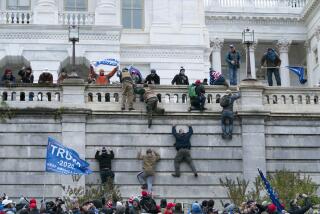Neighborhood Watch on the Contras : Nicaragua: Think of the country as a town invaded by a gang. Whose side would Americans be on?
- Share via
MANAGUA — This week many people have called, asking what in the world we are doing, here in Nicaragua. In the past, parables have often been helpful in making distant and difficult issues more familiar. The following story is simply an attempt to bridge the distance that the distortions of the past week made more difficult to overcome.
The big city of Las Americas is in turmoil. One of the poorest neighborhoods, Nicaville, has been organizing to overcome unemployment, crime and drugs. Its feisty community activists have been demanding a greater say in civic affairs, which have long been dominated by the neighboring USAville.
As Nicaville struggles for autonomy, leaders of USAville decide that the movement is a threat to the way they run Las Americas, and that the newly militant Nicaville residents need to be taught a lesson. Using their powers over banks, USAville rulers red-line Nicaville to prevent its self-development efforts. Through their machinations, stores are closed, jobs are lost and city services are interrupted.
Nicaville, already poor, gets poorer. But Nicaville’s residents don’t back down, and USAville’s leaders turn to violence. They finance a street gang called the Contras, who start a wave of violent crime--arson, robbery, rape, murder.
Nicaville tries to defend itself, and even goes to the highest court with a lawsuit against the backers of the Contras, and wins its case. But the violence and sabotage continue, taking a heavy toll in Nicaville.
(Eight years of Contra war in Nicaragua have claimed 30,000 lives and caused $12 billion in damage.)
Nicaville’s residents organize to defend themselves and fight back. Tensions flare with nearby neighborhoods that have been paid off by USAville’s leaders to harbor and help the Contras. As violence threatens to spread throughout the poor neighborhoods of Las Americas, a special caucus of elected leaders proposes a peace pact.
Representatives of the poor neighborhoods sign an agreement to disband the Contra gang. Nicaville’s activist leaders agree to new local elections, confident that they can win. Unilaterally, in an effort to ease tensions, they stop going after Contra gang members.
USAville’s leaders are unmollified, but in the face of the united position taken by the leaders of Las Americas’ poor neighborhoods, they promise to stop financing violence by the Contras, though they keep sending “nonlethal” funding to the gang. At the same time, they contribute heavily to the electoral campaign of a wealthy woman who represents a group of Nicaville residents opposed to the current community leaders.
(The Bush Administration is sending $9 million to one group of Nicaraguan opposition parties, more than six times our total budget for health services.)
Preparations for Nicaville’s elections go well despite the neighborhood’s desperate economic straits. Almost everyone registers to vote.
(More than 90% of eligible Nicaraguans have registered to vote in next February’s elections.)
But the Contras, after lying low for a while, go on a new crime spree. There are more murders and assaults. USAville’s leaders deny responsibility, but Nicaville has seen this before. Frustrated residents do not see why they should refrain from attacking the Contras if the Contras will not stop attacking them.
(From the beginning of Nicaragua’s unilateral cease-fire in March, 1988, to October, 1989, more than 800 Nicaraguans have been killed and 1,500 wounded; on the very day that U.S. leaders were threatening to renew military aid, the Contras attacked a family cooperative, killing four men--slitting their throats--and wounding five women.)
Nicaville’s leaders announce that they will no longer observe a one-way truce. USAville then claims that the Nicaville leadership, not the Contras, has put the elections in jeopardy. Tensions rise again.
We hope that this parable will help others to relate to what is happening in Nicaragua. As neighbors, we are simply asking that the United States respect and not undermine the agreements made in August by all the political parties participating in the Nicaraguan elections and all the Central American presidents. These agreements call for the demobilization of the Contras, and they are undermined by the continued funding of the Contras by the U.S. Congress, which is a real threat to the electoral process in Nicaragua.
We also ask that the United States respect and not undermine the efforts of observers of our electoral process, representing the United Nations, the Organization of American States and former President Jimmy Carter. So far, these groups have made very positive reports.
Finally, we ask our neighbors to remember that Nicaragua is not so distant, that our struggles here are not that fundamentally different from their own. Ten years of constant conflict between neighbors is far too much. This is why efforts to normalize relations between the United States and Nicaragua are essential.
Nicaragua is not a threat to its neighbors. We are simply trying to defend ourselves as you would, struggling for the right to self-determination as you did. In the end, when people ask what in the world are we doing, I ask, what more can we do?
More to Read
Sign up for Essential California
The most important California stories and recommendations in your inbox every morning.
You may occasionally receive promotional content from the Los Angeles Times.










